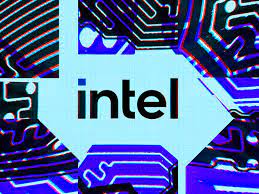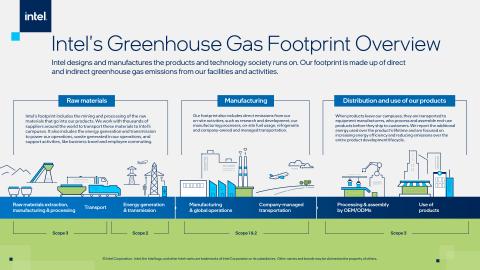Intel Commits to Net-Zero Greenhouse Gas Emissions in its Global Operations by 2040
Intel Corporation

Intel Corporation pledged to achieve net-zero greenhouse gas emissions in its global operations by 2040, to increase the energy efficiency and lower the carbon footprint of Intel products and platforms with specific goals, and to work with customers and industry partners to create solutions that lower the greenhouse gas footprint of the entire technology ecosystem.
“The impact of climate change is an urgent global threat. Protecting our planet demands immediate action and fresh thinking about how the world operates. As one of the world's leading semiconductor design and manufacturing companies, Intel is in a unique position to make a difference not only in our own operations, but in a way that makes it easier for customers, partners and our whole value chain to take meaningful action too.” –Pat Gelsinger, Intel chief executive officer
What It Means for Intel’s Global Operations: Intel is committing to reach net-zero greenhouse gas emissions across its operations, otherwise known as its Scope 1 and 2 emissions, by 2040. Intel’s priority is to actively reduce its emissions, in line with international standards and climate science. It will use credible carbon offsets to achieve its goal only if other options are exhausted.
These targets strengthen Intel’s commitment to sustainable business practices, like its RISE strategy. Intel’s cumulative greenhouse gas emissions over the past decade are nearly 75% lower than they would have been in the absence of investments and action.
“Intel has been a leader in sustainability results for decades. With leadership comes responsibility. We’re now raising the bar and entering an exciting era to achieve net-zero greenhouse gas emissions across our operations by 2040,” said Keyvan Esfarjani, executive vice president and chief global operations officer at Intel. “This will require significant innovation and investment, but we are committed to do what it takes and will work with the industry to achieve this critical mission.”
What It Means for Intel’s Scope 3 Emissions: Intel is also committed to addressing climate impacts throughout its upstream and downstream value chain, also known as Scope 3 emissions. Intel’s Scope 3 strategy focuses on partnering with suppliers and customers to take aggressive action to reduce overall emissions.
What This Means for Intel’s Supply Chain: Intel is actively engaged with its suppliers to identify areas of improvement, including increasing supplier focus on energy conservation and renewable energy sourcing, increasing chemical and resource efficiencies, and leading cross-industry consortia to support the transition to a net-zero greenhouse gas semiconductor manufacturing value chain. To accelerate progress, Intel is committed to partnering with suppliers to drive supply chain greenhouse gas emissions to at least 30% lower by 2030 than they would be in the absence of investment and action.
What It Means for Intel’s Products: To support customer sustainability goals and reduce Scope 3 product-use greenhouse gas emissions, Intel will increase the energy efficiency of its products and continue to drive performance improvements the market demands. Intel is setting a new goal to achieve a five times increase in performance per watt for its next generation CPU-GPU, code-named Falcon Shores. The company remains committed to its 2030 goal to increase product energy efficiency by 10 times for client and server microprocessors.
Intel has also set a new goal to lower emissions related to reference platform designs for client form factors by 30% or more by 2030. These efforts are taking shape with Dell’s Concept Luna prototype device, developed in partnership with Intel to showcase future possibilities for sustainable PC design.
About Creating More Sustainable Solutions: Intel is collaborating with hundreds of customers and industry partners to create solutions that meet the need for exponentially more computing processing power, while running more efficiently and using less energy. For instance, Intel is partnering to launch liquid immersion cooling pilot deployments for data centers across cloud and communications service providers, with companies such as Submer. This includes embracing new principles, such as heat recapture and reuse via immersion cooling.
“99% of heat generated by IT equipment can be captured in the form of warm water, practically without losses and at much higher temperatures. Through partnership with Intel, Submer is able to scale a validated immersive cooling solution that saves energy while providing the ability to capture and reuse the subsequent thermal heat,” said Daniel Pope, co-founder and CEO of Submer. “This will fundamentally change the way data centers are built and operated.”
Increasing access to renewable energy is a critical step in reducing global greenhouse gas emissions. Intel has developed a solution that can be integrated into existing energy grid infrastructure to create a smarter grid that can adapt to changing energy consumption needs and sources. Intel and some of the world’s largest utility operators formed the Edge for Smart Secondary Substations Alliance to modernize energy grid substations and better support renewable energy sources. France’s largest grid operator, Enedis, recently joined to upgrade its more than 800,000 secondary substations with solutions that provide real-time control across the network.
Intel’s programmable hardware and open software also deliver capabilities that enable greener solutions for customers. For example, within its data center that houses 5G communication facilities, Japan telecommunications operator KDDI reduced overall power consumption by 20% in a trial using Intel® Xeon® Scalable processors and Intel’s comprehensive power management and AI capabilities, giving it the ability to scale power consumption according to demand.
View the full release here: https://www.businesswire.com/news/home/20220413005299/en/
Source: Intel newsroom





